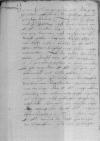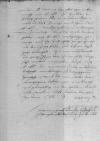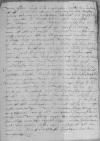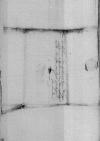 APG 300, 53, 249, p. 137
APG 300, 53, 249, p. 137
Unsern freuntlichen grus und alles guts zuvoran. / Ersame, namhafftige hern(n), gunstige freunde. /
Uns sein im zcoge und zu ⌊Heÿlsberg⌋ negst zwen brive von E(wer) Er(barkei)t worden, / der ⌊⌋ den XV, / der ⌊⌋ im XIX December negst vorschinnen, zcu ⌊Dantzke⌋ geben, / den(n) wir bisher, / ehr dan wir dysen unsern ⌊bruder⌋ an E(wer) Er(barkei)t theten fertigen, / fueglich nicht haben mocht antwortten. / Uff den ersten, der muncz halben, / lasse wir E(wer) Er(barkei)t protestacion, so zu ⌊Grawdentz⌋ geschen, in yrer wirden. / Es het uns aber, / E(wer) Er(barkei)t zu gut, / vil bekwemer(r) und besser gefallen, / das solch muntzen zu ausgange der ⌊thagfart⌋ ⌊Peterkaw⌋ wer angestanden. / Vorursacht uns beysorge, / das E(wer) Er(barkei)t nicht erkeine swerheit ader widerwerthicheytt auss solch ein muntzen auss gedachter ⌊thagfarth⌋ entstunde, / dieweil wir wÿssen, dass nicht wenig sein, dy E(wer) Er(barkei)t nicht im besten zugethan etc. Im andren, wy E(wer) Er(barkei)t berurt dy leczte zalunge der scherffaw, / hab wir gedachten  APG 300, 53, 249, p. 138 unsern ⌊bruder(r)⌋ mit schryfftlicher voller macht mit E(wer) Er(barkei)t / zu handlen befellich geben, / der in unserm nhamen(n) al dass jennige wirdt thun, / wÿ E(wer) Er(barkei)t vorschreybungen mitbrengen, / der zuvorsicht, / was dÿ wirde des horn(?) goldes(s) / noch E(wer) Er(barkei)t vorsigelthen gewicht / und dÿ anderhalb jerigen zcinser mit den zweÿ fassen stur biss an dyse zceÿt belangett, / so wir unbeswertt ein gantz jhar, das zuvor soldt angesagt worden, nachlassen, / dass sich E(wer) Er(barkei)t, der wir viel liebs und freuntlicheytt wircklichen zu ertzeÿgenn(n) geneÿgt / und dy wir Gotte dem almechtigenn befelhen, / gen uns recht und gutwyllig werden halden. /
APG 300, 53, 249, p. 138 unsern ⌊bruder(r)⌋ mit schryfftlicher voller macht mit E(wer) Er(barkei)t / zu handlen befellich geben, / der in unserm nhamen(n) al dass jennige wirdt thun, / wÿ E(wer) Er(barkei)t vorschreybungen mitbrengen, / der zuvorsicht, / was dÿ wirde des horn(?) goldes(s) / noch E(wer) Er(barkei)t vorsigelthen gewicht / und dÿ anderhalb jerigen zcinser mit den zweÿ fassen stur biss an dyse zceÿt belangett, / so wir unbeswertt ein gantz jhar, das zuvor soldt angesagt worden, nachlassen, / dass sich E(wer) Er(barkei)t, der wir viel liebs und freuntlicheytt wircklichen zu ertzeÿgenn(n) geneÿgt / und dy wir Gotte dem almechtigenn befelhen, / gen uns recht und gutwyllig werden halden. /
Datum(m) auss unserm sloss ⌊Lobaw⌋, den XXII Ianuarii M D XXXVIIIt(en).
⌊Joa(n)nes⌋, vo(n) Gots gnad(en) colmischr bÿschoff, ad(ministrator) zu ⌊Pomesan⌋ und postulirt zcu ⌊Ermela(n)d⌋
 APG 300, 53, 249, p. 139
APG 300, 53, 249, p. 139
Wir haben auch auss eingelegtem zcedel im leczten E(wer) H(erlichkei)t brive vornhomen(n), / wy unser des ⌊byschtumbs Ermelandt⌋ underthan betruck mit hoppen(n) im marckte zu ⌊Dantzke⌋. / Solte thun vormischen den althen mit dem newen(n), / dorauss das bir vortorbe etc. Hiruff fuege wir freuntlichs was E(wer) Er(barkei)t zu wyssen, / das solche vormischunge nicht wol ein betrug muge genant werdenn(n), so solchs auch under weÿllen von den brewern(n) zu ⌊Dantzke⌋ gebraucht wirdt. / Dobeÿ yst / auch idrem, der hoppe kaufft, frey, / den hoppen zuvor zubesichtigenn / und darnach zu thun und lassen. / Es bedunckt uns aber, dass geringe bus dy so vorterben / von wegen des newen uffsaczes uber dy axise mit mer wasser, dan zuvor gebrawt, / ein ursach sey etc. Nicht wennigers hab wir befolhen und den unsern(n) gebythen lassen, / das sy sich keynnes betrucks fleÿssen, sonder mit guther whar zum marckte komen sollen. / Uns sein aber von den unsern swere klage zu ko(m)men / von wegen des newn(?) uffsaczes(?), / der vor im lande hie nie gehort, / alse nemlich, das dy unsern(n) E(wer) Er(barkei)t von biere zcollen ander zceyssen mussenn(n), / das wir freuntlich begeren(n) abtzustellen text damaged⌈[llen]llen text damaged⌉. In der ⌊stadt⌋ mit E(wer) Er(barkei)t mitburgern / der mass uffsatz zu machen, lassen wir geschen. / Wirdt weÿtter solche klage an uns khomen, / wy E(wer) Er(barkei)t wol haben zuermessenn(n), / muge wir von pflicht wegen den unsern nicht absten, / solchs, was ihn abgedrungen(n), wider zuvordern und wy byllich dobeÿ thun, / dass E(wer) Er(barkei)t, der wir mit aller freuntschafft zugethan, werden(n) vorhalthen(n) etc.
 APG 300, 53, 249, p. 138 unsern
APG 300, 53, 249, p. 138 unsern 


